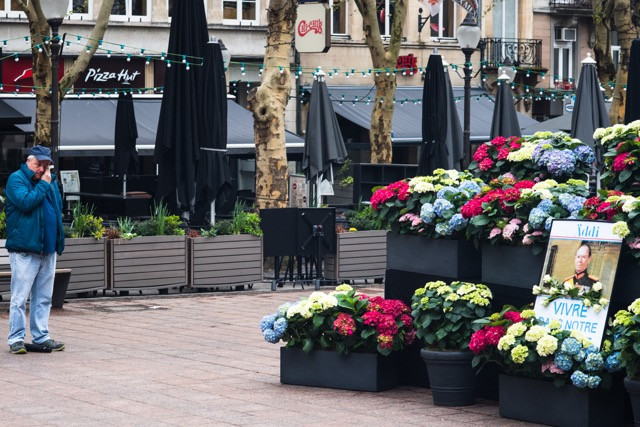1. Royals take centre stage
Even though this was a grand occasion of state, it was above all a family funeral. The Luxembourg royals took centre stage as they mourned the head of their family, with politicians remaining discreetly in the background. And royal guests from Europe’s last remaining constitutional monarchies also outshone their civic counterparts thanks to being able to wear dress uniform.
2. Crowds despite the rain
Saturday’s at times appalling weather conditions were not enough to dissuade people from flocking into the city centre to witness the funeral procession in the streets or watch the live broadcast on the giant screens on the place d’Armes. Luxembourg was united in its desire to pay its final respects to Grand Duke Jean.
3. Multilingualism is part of the fabric of life
Readings and addresses during the funeral ceremony were spoken in Luxembourgish, English and French. While he commenced in Luxembourgish, Archbishop Hollerich specifically switched to English to address a congregation composed of numerous international guests from around the world. Grand Duke Jean’s grandchildren delivered a succession of readings in the language in which they felt most comfortable.
4. Hats off
Given the choice to wear a hat or not, several female guests, including Grand Duchess Maria Teresa, chose to eschew a head covering.
5. Military honour
The presence at the funeral of the Chief of the General Staff of the British army, General Sir Mark Alexander Popham Carleton-Smith, showed exactly how highly regarded Grand Duke Jean was among his regiment, the Irish Guards.
6. Luxembourgers love bagpipes
The playing of “Highland Cathedral” by pipers from the Irish Guards was among the highlights for many Luxembourgers with close connections to the United Kingdom. Robbi Sinner, husband of cabinet minister Corinne Cahen, said on Facebook that it was the “most excellent moment by far [...]”
7. Trier is not in Luxembourg
Several Luxembourg Facebook users pointed out that the German edition of Gala Magazine somehow managed to report from the funeral cortege in “the old town of Trier”.
8. A temporary dissenting voice
Leave it to outspoken musician Serge Tonnar to raise dissenting voice regarding the media coverage of the funeral and state mourning. In a Facebook post, Tonnar questioned whether the “liveticker, livestream, special programmes, live broadcast of the funeral mass” and general “mourning orgy in the media”, which often had nothing to say, was appropriate. “Is that the discretion that the people wanted in their hearts for the national mourning?” Tonnar asked. By Monday, however, Tonnar had deleted the post.
